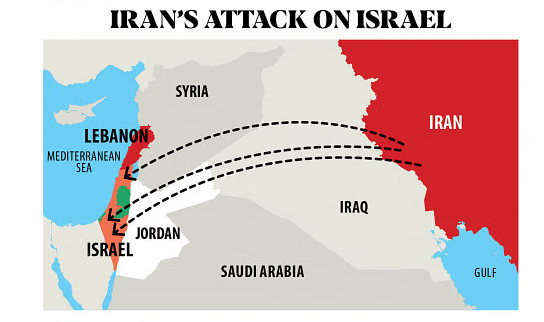On the morning of April 14, 2024, sirens wailed across Israel as Iranian forces launched a major offensive. In a dramatic escalation, Iran unleashed a barrage of over 300 drones and missiles, marking the first direct attack on Israeli soil by the Islamic Republic.
Targets and Defenses:
While the full list of intended targets remains undisclosed by Iran’s Revolutionary Guard Corps, the primary focus appeared to be a strategically important airbase in southern Israel: Nevatim. This facility houses Israel’s most advanced warplane, the F-35 stealth fighter jet.
Israel’s well-developed air defense system, known as the Iron Dome, sprang into action. According to the Israel Defense Forces (IDF), they successfully intercepted a staggering 99% of the incoming Iranian projectiles. This included downing 170 drones, 30 cruise missiles, and a significant portion of the 120 ballistic missiles launched.
Uncertainties and Repercussions:
The exact reasons behind Iran’s decision to launch this large-scale attack remain unclear. However, it likely stems from heightened tensions in the region, possibly linked to a previous Israeli operation (mention the suspected Israeli strike on the Iranian consulate in Syria, if known). This event serves as a stark reminder of the fragile security situation in the Middle East and raises concerns about a potential wider conflict.
Israel’s Multi-Layered Defense Thwarts Iranian Missile Barrage
While the initial reports of widespread destruction painted a grim picture, a closer look reveals the effectiveness of Israel’s air defense system in mitigating the Iranian attack. According to Rear Admiral Daniel Hagari, the top spokesperson for the Israeli Defense Forces (IDF), a coordinated effort involving the Israeli Air Force and their allies successfully neutralized all drones and cruise missiles before they breached Israeli airspace. This crucial intervention involved collaboration with the United States, United Kingdom, Jordan, and France, showcasing a united front against the aggression.
The disparity in flight times played a key role in this success. Drones and cruise missiles, with their multi-hour journeys, provided ample warning time. This allowed for coordinated tracking and interception by the combined air forces, effectively neutralizing them before they could pose a threat to Israeli soil.
The real challenge, however, came from the ballistic missiles. With a much steeper trajectory and significantly shorter flight time – around 10 minutes – these missiles presented a more formidable obstacle. Here, Israel’s advanced Arrow air defense system came into play. Designed specifically to counter this threat, the Arrow 3 system boasts the capability of engaging and destroying ballistic missiles outside of the Earth’s atmosphere, significantly reducing the risk of damage within Israeli territory. While some missiles did manage to penetrate the initial defenses, the IDF reported successfully intercepting the vast majority of the 120 ballistic missiles launched by Iran.
This coordinated response highlights the effectiveness of Israel’s multi-layered air defense system and the importance of international collaboration in maintaining regional stability.
The attack on Israel differed from previous incidents involving drones and cruise missiles, as it involved ballistic missiles that were intercepted over Israeli territory. This prompted the Israeli Defense Forces (IDF) to activate warning sirens out of concern for falling shrapnel. The only reported injury in Israel resulting from the Iranian attack was a Bedouin girl who was struck and seriously wounded by falling shrapnel in the Negev desert.
Explosions were heard across the country as a consequence of the Arrow missile interceptions, despite the interceptions occurring high in the sky and, in some instances, in space. The flashing lights observed in the sky were caused by both the interceptions themselves and the falling shrapnel.
While most of the ballistic missiles were successfully intercepted, a few managed to evade Israeli defenses and hit the Nevatim base. The IDF reported minor damage to infrastructure at the airbase, which nonetheless remained operational on Sunday morning.
This unprecedented attack on Israel occurred amidst escalating tensions between Israel and Iran. The Islamic Republic vowed retaliation following the deaths of seven Islamic Revolutionary Guard Corps (IRGC) members, including two generals, in an alleged Israeli airstrike near Tehran’s consulate in Damascus on April 1.




